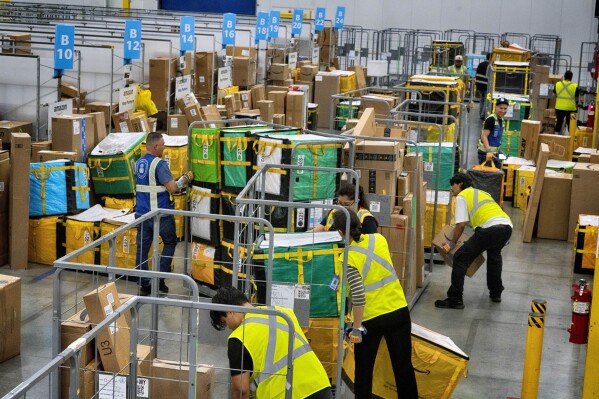BANGKOK (AP) — Shares tumbled Friday in Asia, with Japan’s Nikkei 225 index slumping 5.1%.
The declines followed a retreat on Wall Street after weak data on the U.S. economy raised worries the Federal Reserve may have missed its window to cut interest rates, which its chairman Jerome Powell has said could come in September, before undercutting the economy’s growth.
The Nikkei 225 in Tokyo lost more than 1,900 points to 36,199.31 and the Hang Seng in Hong Kong dropped 2.1% to 16,950.59.
Shares in other Asian markets also sank.
The Shanghai Composite index saw a more modest loss, of 0.5% to 2,919.32.
The Kospi in Seoul dropped 3.3% to 2,687.31 and Taiwan’s Taiex sank 3.8%. Both markets tend to be hit hard due to huge companies in the technology sector.
South Korea’s Samsung Electronics dropped 3.6% while another maker of computer chips and other components, SK Hynix, dropped 8.6%. Taiwan Semiconductor Manufacturing Co., the world’s largest chip maker, lost 5.1%.
Elsewhere in Asia, Australia’s S&P/ASX gave up 2.1% to 7,940.70 and the Sensex in India was down 1%. Bangkok’s SET fell 0.4%.
“The short-lived satisfaction of Fed Chief Powell communicating decent odds of a September rate cut has turned sour as investors are now panicking that the central bank isn’t trimming soon enough,” José Torres, a senior economist at Interactive Brokers, said in a commentary.
Japanese shares have been pummeled after the central bank raised its benchmark interest rate on Wednesday. That pushed the value of the Japanese yen higher against the U.S. dollar.
The dollar rose to 149.39 yen from 149.37 yen. It had recent traded above 160 yen.
The euro rose to $1.0796 from $1.0789.
A stronger yen tends to hurt overseas earnings of major manufacturers like Toyota Motor, whose shares fell 2.7%. It also might impact arrivals of foreign tourists who have flocked to the country to enjoy bargains thanks to prolonged weakness in the Japanese currency.
On Thursday, the S&P 500 sank 1.4% to 5,446.68 after a report showed U.S. manufacturing activity is still shrinking. The Dow Jones Industrial Average fell 1.2%, to 40,347.97, and the Nasdaq composite dropped 2.3% to 17,194.15. The small stocks in the Russell 2000 index dropped 3%.
Manufacturing has been one of areas of the economy hurt most by high interest rates, and the report from the Institute for Supply Management helped extinguish what had been gains for U.S. stock indexes early in the morning. Other reports Thursday showed the number of U.S. workers applying for jobless benefits hit its highest level in about a year and that productivity for U.S. workers improved during the spring.
Together, the data likely remove upward pressure on inflation and give more leeway for the Federal Reserve to cut interest rates. A day earlier, yields sank after Fed Chair Jerome Powell gave the clearest indication yet that inflation may have slowed enough for an easing of rates to begin in September.
Worry is mounting that the Fed may have held rates too high for too long in its zeal to stifle inflation. It has kept its main interest rate at a two-decade high for roughly a year, making it more costly to borrow to buy a house, car or anything on credit cards. It could take months to a year for the full effects of a rate cut to filter out into the economy.
Traders are unified in their belief the Federal Reserve will cut its main interest rate in September. The only question is how many times it may cut this year and next.
Stocks of companies whose profits are most closely tied to the economy’s strength had some of Wall Street’s sharper drops. Energy stocks in the S&P 500 fell 2.6%, for example, while industrial companies in the index weakened by 1.8%.
The weak economic numbers raise the stakes for an already highly anticipated employment report coming on Friday. Economists expect it to show a slight slowdown in U.S. hiring last month. But the figures could be skewed by the effects of Hurricane Beryl, so the headline number might look worse than underlying fundamentals suggest.
The S&P 500 would have dropped even more Thursday if not for Meta Platforms. The company behind Facebook and Instagram climbed 4.8% after reporting profit and revenue for the latest quarter that topped analysts’ expectations.
Other technology companies got a less welcoming reception from investors. ARM Holdings delivered better profit and revenue for the latest quarter than expected, for example. But its U.S.-listed shares nevertheless tumbled 15.7%.
Benchmark U.S. crude oil gained 54 cents to $76.85 per barrel. Brent crude, the international standard, was up 53 cents at $80.50 per barrel.
___
AP Business Writer Stan Choe contributed.
Based in Bangkok, Kurtenbach is the AP’s business editor for Asia, helping to improve and expand our coverage of regional economies, climate change and the transition toward carbon-free energy. She has been covering economic, social, environmental and political trends in China, Japan and Southeast Asia throughout her career.Disclaimer: The copyright of this article belongs to the original author. Reposting this article is solely for the purpose of information dissemination and does not constitute any investment advice. If there is any infringement, please contact us immediately. We will make corrections or deletions as necessary. Thank you.



